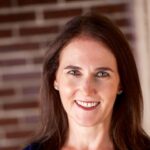We were in triangle pose—a challenging posture where you bend the body sideways over straight legs. One arm extends upwards towards the sky while the other reaches down for the floor. Reaches is the key word, because depending on your flexibility, the hand aiming for the floor may not get there. Or even close. And that is ok.
“If your hand doesn’t touch the floor, use a block to raise the floor up to you,” my yoga instructor advised the class. She often explains how the postures work so we can adapt them to our particular body types. “When you have greater awareness,” she continued, “you have more options.”
And something clicked. As is often the case, wisdom from my yoga practice translates directly to my life with hearing loss. Whether it is yoga or hearing loss (or anything else), greater awareness breeds a wider range of options for success.
Greater Self-Awareness Helps Boost Success
The more we understand about our own hearing loss, the better able we are to ask for the specific assistance that we need. People are not mind readers which means self-identifying as having hearing loss is often not enough to create good communication.
It is up to us to understand the technologies and other accommodations that work best for us, so we can ask for them.
How do we develop this knowledge?
Hearing care professionals provide some of it, but often the day-to-day, nitty-gritty details of living with hearing loss come from other sources. Trial and error is a terrific teacher. As are hearing loss peers who have likely experienced the same challenges.
Find hearing loss peers on social media (my Facebook group is Living With Hearing Loss) or through support networks like Hearing Loss Association of America (HLAA). Books and films about hearing loss can also bring new insights.
Bottom line: the more you know, the more options you will have for communicating successfully.
General Awareness Creates Better Accessibility
The same holds true for the population at large.
The more check-out clerks and waiters and flight attendants understand about the needs of people with hearing loss, the more readily they can serve our needs. Ditto for our colleagues at work and our friends and family. The more they know, the better they can not only meet our needs, but anticipate them. And the easier it will be for them to do so.
We expect health care providers to understand hearing loss, but many do not take it seriously. Mumbling support staff and frazzled technicians can make quality healthcare challenging to achieve. Much education is needed about captioning, hearing loops and other assistive listening technologies so that theaters, schools, hospitals and other public venues can build them into their standard operating procedures.
Individual advocacy benefits us all
Advocacy and more advocacy is needed, both by large consumer organizations like HLAA, but also by individuals with hearing loss like us. Constantly advocating for our needs can be exhausting, but the payoff is great, not only for ourselves, but for all people with hearing loss.
Each time we advocate for ourselves, we educate others, so they are better prepared to meet the needs of the next person with hearing loss they meet. It is a virtuous circle where we all benefit.
And so, the work continues…

Shari Eberts is a passionate hearing health advocate and internationally recognized author and speaker on hearing loss issues. She is the founder of Living with Hearing Loss, a popular blog and online community for people with hearing loss, and an executive producer of We Hear You, an award-winning documentary about the hearing loss experience. Her book, Hear & Beyond: Live Skillfully with Hearing Loss, (co-authored with Gael Hannan) is the ultimate survival guide to living well with hearing loss. Shari has an adult-onset genetic hearing loss and hopes that by sharing her story, she will help others to live more peacefully with their own hearing issues. Connect with Shari: Blog, Facebook, LinkedIn, Twitter.






